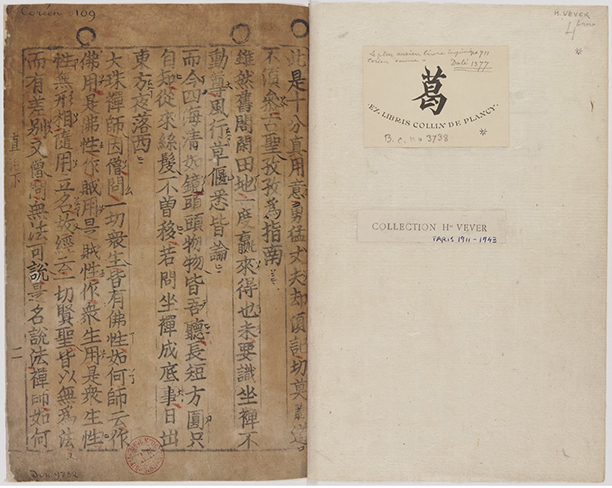68 Ancient Korean

Written by the Buddhist monk Kyŏnghan Kyŏnghan and printed in Hŭngdŏksa Temple in 1377 in Korea this work of Zen Buddhism is referred to as Chikchi. The collection is abstracted from preachment, conversations and letters by many monks. The main idea of Chikchi is that genuine attainment of Nirvana is completed when people realize the nature of the conscientious mind in human equals to the nature of Buddha. As compiler, Kyŏnghan added other core contents to the original copy sent by the Yuan Dynasty (1271–1368) in China, and it was used as a textbook, primarily for the education of Sŏn (Zen) monks and not published in large quantities.1
During the Koryŏ dynasty (918-1392) in Korea, Buddhism was so popular that Koryŏ was often referred to as a Buddhist state. Although Confucianism was the political creed of the Koryŏ state, Buddhism served as its spiritual guidance and had a significant impact on the daily life of the Koryŏ people.The reason this edition of the book became so famous is that because it is the first in the world to be printed with movable metal type. It predates by nearly 75 years Johannes Gutenberg’s acclaimed 42-line Bible printed in Germany between 1452-1455. UNESCO confirmed the book as the world’s oldest metalloid type and registered it as part of the “Memory of the World” in September 2001.2
During the time of the Korean Empire (1897-1910), the book was removed from Seoul by the French diplomat Victor Collin de Plancy. It was one of the numerous books that he acquired and kept in his private library, and which he in turn handed over to Henry Vever, a preeminent jeweler and collector of Asian antiques. Chikchi was in turn donated to the National Library of France (Bibliothèque nationale de France) in 1950.3 Only the second volume of the book has survived to the present-day, and just 38 of its 89 chapters have been preserved.
As the official language of both South and North Korea, Korean is the native language of more than 77 million people worldwide.4 The Library’s Korean holdings exceed 102,000 volumes. Outstanding among these are the 4,000+ volumes of the Asami library, assembled by Asami Rintarō in the early decades of the 20th century and purchased by the Library 30 years later.5 In 1942, UC Berkeley became the first university in the country to offer instruction in Korean, which continues to be taught for all academic levels in the Department of East Asian Languages and Cultures.
Contribution by Jaeyong Chang
Librarian for the Korean Collections, C.V. Starr East Asian Library
Sources consulted:
- Kim, Jongmyung. “The Chikchi and Its Positions in Fourteenth-Century Korea,” Religions 2020, 11(3), 126; https://doi.org/10.3390/rel11030126
- Garry, Jane, and Carl R. G. Rubino. Facts About the World’s Languages: An Encyclopedia of the World’s Major Languages, Past and Present. New York: H.W. Wilson, 2001.
- Kyŏnghan, 1299-1375. Chikchi. Chʻungbuk Chʻŏngju-si : Chʻŏngju Ko Inswae Pangmulgwan, 2005.
- Ethnologue: Languages of the World (accessed 6/18/20)
- UC Berkeley Center for Korean Studies (accessed 6/18/20)
Title in English: Anthology of Great Buddhist Priests
Author: Kyŏnghan, 1299-1375
Imprint: Hŭngdŏksa, Ch’ŏngju, Korea (1377).
Edition: 1st
Language: Korean, or Traditional Chinese (so-called “Hanmun” in Korean)
Language Family: Koreanic
Source: Gallica (Bibliothèque nationale de France)
URL: https://gallica.bnf.fr/ark:/12148/btv1b10527116j
Select print editions at Berkeley:
- Chikchi. ha / [pʻyŏnja Kyŏnghan]・直指・ 下/[編者景閑. Sŏul: Taehan Minʼguk Munhwa Kongbobu Munhwajae Kwalliguk, 1987. Facsimile of 1377 edition in case.
- Chikchi. ha / [pʻyŏnja Kyŏnghan]. 直指. 下 / [編者 景閑]. Seoul: Taehan Minʼguk Munhwa Kongbobu Munhwajae Kwalliguk, 1973. Vol. 1: Reprint. Original text of 1377 printing. Vol. 2: Pulcho chikchi simchʻe yojŏl haeje / Chʻŏn Hye-bong in English, French, Japanese and Korean.
- Pulcho chikchi simchʻe yojŏl / Paegun Sŏnsa chiŭm; Pak Mun-yŏl omgim. 불조직지심체요절 / 白雲禪師지음 ; 박문열옮김. Sŏul-si: Pŏmusa , 1997.

